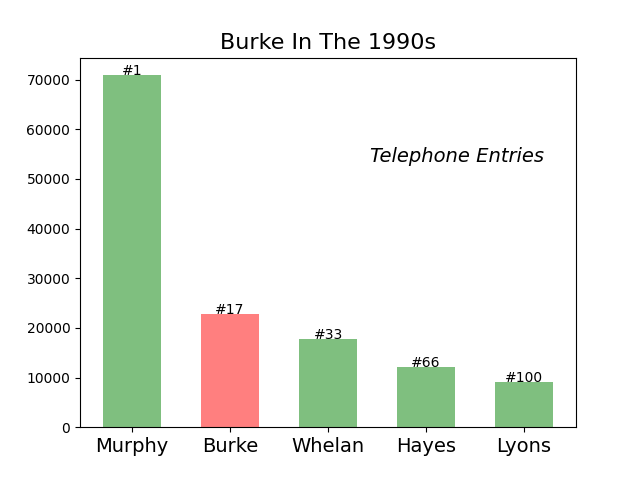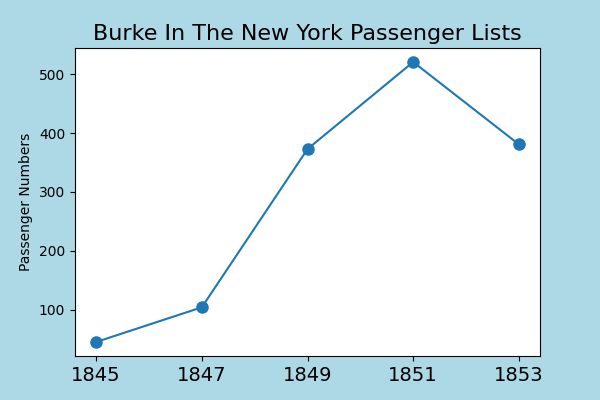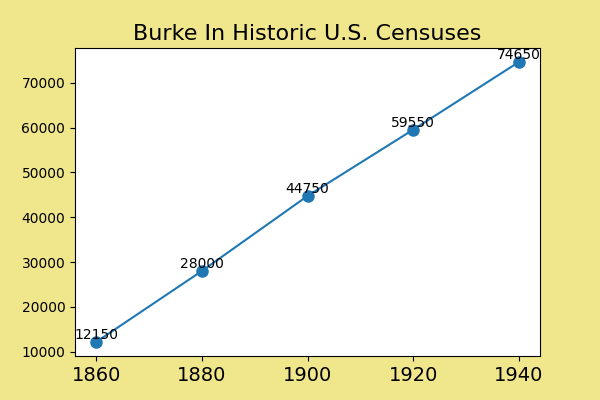This article looks at how common Burke is as a last name in Ireland and the United States from the 19th century to the present day.
You’ll learn the meaning and origins of the Burke surname while exploring some notable and famous people that held it.
I use census records, emigration lists, and military archives to uncover fascinating patterns. If you’re studying your genealogy, check out my sources at the end of the post so you can do your own research.
How Common Is Burke As A Surname In Ireland?
Detailed current statistics about surnames are not publicly released by the Irish government. Instead, they offer the ten most frequently occurring surnames among newborns in the previous year. Burke doesn’t make this top list.
So, I had to look elsewhere for population estimates. Thankfully, an Irish genealogist researched the prevalence of Irish surnames through national phone directories published in the 1990s. Seán Murphy’s estimates aren’t as robust as a census but give a good broad estimate.
Burke was ranked 17th in the top one hundred names in this decade with a total of 22,900 entries.
This graphic shows how it ranks compared to the 1st, 33rd, 66th, and 100th entries in the survey:

Burke In The Early 1900s
The Irish diaspora is large and widespread with a significant number of people emigrating to other parts of the globe. The destinations traditionally have been England, the U.S., Canada, and Australia. Emigrants were driven by various factors like political unrest, poverty, and food scarcity.
The largest wave of emigration to the United States occurred during the 19th century. The peak was in response to the Great Irish Famine, which took place between 1845 and 1852. A plant disease devastated the main food and income crop for much of the population.
So, let’s focus on the early 1900s.
I used online archives to calculate the total numbers by surname. I consider these estimates due to some percentage of transcription errors. So, I’ve rounded the numbers to the nearest fifty.
There were 14,350 residents named Burke on the island in 1911.
Ten years earlier, Burke had about 14,450 residents in the 1901 census.
Population Estimates In The 1890s
A study of Irish surnames was conducted in 1890 by the head of the Civil Registrations Office. It was published as a “Special Report on Surnames In Ireland.”
The survey estimated that there were about 15,900 people named Burke in the country.
Emigration To America After The Irish Famine
The Irish diaspora is large and widespread with a significant number of people emigrating to other parts of the globe. The destinations traditionally have been England, the U.S., Canada, and Australia. Emigrants were driven by various factors like political unrest, poverty, and food scarcity.
The largest wave of emigration to the United States occurred during the 19th century. The peak was in response to the Great Irish Famine, which took place between 1845 and 1852. A plant disease devastated the main food and income crop for much of the population.
I studied the Burke name in the shipping passenger lists arriving in New York during this period. The departures were from both Ireland and England.
This picture shows how the numbers rose and fell in the years after the famine:

Estimating Rank In The United States
The United States publishes high-level details from the 2010 census that includes the totals of surnames with over one hundred bearers.
I reviewed the list to identify which names are predominantly Irish in origin to provide an estimate of the rankings of Irish names in the United States.
Historically, some Irish families with Gaelic surnames took English-sounding names as translations under the influence of colonization.
As these names also have English origins, they will have been brought to the United States by both British and Irish immigrants. Because the census doesn’t ask about specific European origin (e.g. England vs Ireland), it’s impossible to identify the proportion with Irish heritage.
For the purpose of this website, I’ve mostly excluded names that have varying origins when considering “Irish” names in the U.S. censuses.
With that explanation out of the way, let’s look at how Burke ranks in America.
How Common Is Burke As A Last Name In The United States?
Based on the 2010 U.S. census, the name Burke ranks about 246 among Irish names in America with 122,877 bearers.
Burke In Historic Census Years
It is fascinating to examine how the prevalence of a surname shifts over the course of time in a country as young as the United States. As well as immigration, this reflects other demographic shifts across the nation. Factors include higher child mortality rates and longer life expectancy.
The historic census records have been transcribed and digitized. I used online archives to run counts of surname populations.
But the totals can’t be exactly accurate due to transcription errors. So, I’ve rounded the numbers to the nearest 50 in the graph below.
This picture shows the numbers every twenty years from 1860 to 1940.

These are the numbers in the graph:
- 1860: 12,150
- 1880: 28,000
- 1900: 44,750
- 1920: 59,550
- 1940: 74,650
Burke In World War II
Approximately 8.3 million men and women joined the United States Army during World War II. Many had Irish ancestry. Some had been born in Ireland before leaving the country.
I found registration records for 4,584 soldiers named Burke who enlisted between 1938 and 1946.
47 were born in Ireland.
Burke Surname: Meaning And Origin
Burke is the English version of the Gaelic surname “De Burca”, which in turn is the Gaelic version of a Norman name, de Burgh.
The Norman knight William Fitz Adelm de Burgh was sent to Ireland by Henry II following the Norman Invasion of the 12th century. William De Burgh became governor of Ireland for a time. His descendants adopted the Gaelic version of De Burca.
You’ll still find people named De Burgh in Ireland, but Burke has become far more prevalent.
Famous Or Historic People Named Burke
Here are some notable people with the family name:
- Edmund Burke (1729-1797): Dublin-born philosopher who was elected to the House of Commons in 1765. His philosophical works remain influential in modern-day conservative politics.
- Aedanus Burke (1743-1802): Galway-born American politician and judge in South Carolina who opposed ratification of the Constitution of the United States.
- John Burke (1786-1848): from a Tipperary family, John Burke worked with his son Bernard to publish the genealogy of British aristocracy. “Burke’s Peerage” is still a go-to source for researching titles.
- Aoife de Búrca (1885-1974): a nurse who rushed to Dublin’s city centre when she heard that the Easter Rising had started. She tended the wounded insurrectionists for the duration of the rebellion.
Sources

External Research
The Ireland 1990s estimates are from Seán J. Murphy’s research paper.
The population estimates of 1890 are based on the “Special Report on Surnames in Ireland“, published in 1909.
The population figures for the 2010 U.S. Census come from a file provided by the U.S. Census Bureau.
Internal Research
Some of the population numbers are based on my own research and calculations using online archives. I’ve rounded those numbers to the nearest 50 to account for transcription errors and other technical issues with online databases of this type.
The Irish census estimates for 1901 and 1911 are my calculations based on the Irish National Archives
I plotted the emigration figures from 1845 to 1854 based on calculations from the archives of the New York Passenger Lists (1820-1957).